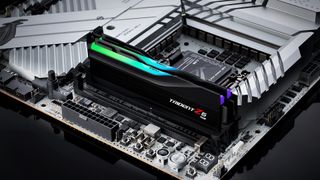G.Skill has launched the market's fastest retail DDR5 memory kit yet. Clocking in at DDR5-8000, the new Trident Z5 RGB memory is ready to compete with (and likely scream past) the best RAM on the market.
The DDR5-8000 memory kit hails from G.Skill's Trident Z5 RGB lineup, and it's available in both matte black (F5-8000J3848H16GX2-TZ5RK), and metallic silver (F5-8000J3848H16GX2-TZ5RS) trims. It comes with two 16GB DDR5 memory modules rated for DDR5-8000. G.Skill binned the memory modules with timings of 38-48-48-128, requiring 1.45V to hit the advertised data rate.
The Trident Z5 RGB DDR5-8000 is not your run-of-the-mill memory kit and requires a capable processor with a strong IMC (integrated memory controller). In addition, you'll need one of Intel's 13th Generation Raptor Lake chips, which are superior to AMD's Ryzen 7000 lineup regarding integrated memory controller (IMC) strength. Even the most exceptional Ryzen 7000 samples stop at DDR5-6600.
G.Skill tested the Trident Z5 RGB DDR5-8000 memory kit with the flagship Core i9-13900K on Asus' ROG Maximus Z790 Apex, a motherboard that caters explicitly to overclocking. Unfortunately, that's the only motherboard G.Skill has validated for the new speedy-fast DDR5-8000 memory kit. Like most DDR5 memory kits, the Trident Z5 RGB DDR5-8000 supports XMP 3.0. However, it's unlikely that the memory kit will work right off the bat without some manual tuning unless your processor has a strong IMC.
The Trident Z5 RGB DDR5-8000 memory kit will be available this month. Newegg has listed the metallic silver version for $529.99 (opens in new tab), whereas the matte black version costs $534.99 (opens in new tab). Both should be in stock very soon. The DDR5-8000 memory kit isn't the fastest kit that G.Skill has up its sleeves, though. The memory vendor has already demonstrated DDR5-10000 on air cooling, so it should be a matter before G.Skill brings those speeds to retail as well, for a small fortune.

